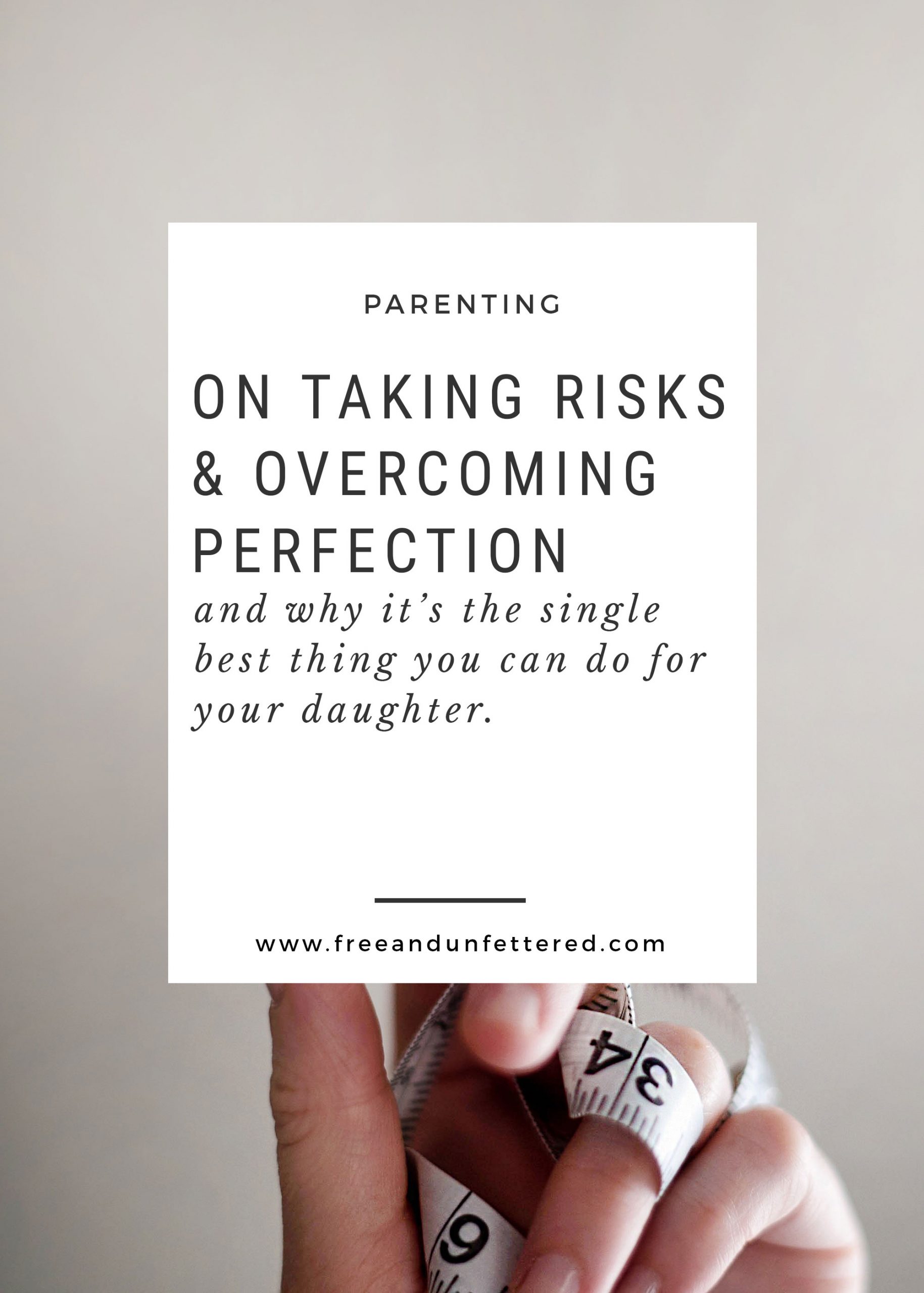On Taking Risks & Overcoming Perfection
I play it safe. I rarely take risks. I suffer from a paralyzing fear of failure.
I am trying to change. I have to change.
Why?
Because I hope to ensure my daughter does not suffer from the same complex. Instead, I want her to take risks, accept challenges, learn by failing, embrace her imperfections, and be completely authentic.
According to Reshma Saujani, the founder of Girls Who Code, the demand for perfection is widespread among women, and she blames the way in which our culture treats young girls:

Looking back, I realize how many lost opportunities there have been because of fear, how much time I’ve wasted collectively over the years worrying about things ultimately beyond my control, and how many times I’ve passed on starting new endeavors because I was afraid that I would make mistakes. For example, I’ve wanted to learn to sew for years. My husband bought me a sewing machine for my birthday. I began reading about sewing, pinning free patterns on Pimterest, and daydreaming about designing my own patterns one day. But guess who still hasn’t ever sewn?
Learning inherently involves some level of failure. How can anyone be perfect at something they’ve never tried? It’s an absurd thought, right? To even postulate, “Hmm, this is my first time ever doing this, and therefore I must be perfect.” It’s complete absurdity, right? I mean, how many times do babies fall down when they begin to walk? This “failure” doesn’t phase them; they get right back up and try again. And then they keep right on walking and walking until soon they are running and jumping and skipping and hopping. Their countless tumbles and falls and trips rarely slow them down because they are following their natural desire to learn how to coordinate their body movements to allow them to perform all these new and exciting actions.
The same thing happens with language — from cooing to babbling to a first word followed by many words and then onto sentences and questions, all while improving their articulation. Does it frustrate them when they are misunderstood in the early years due to incomprehensibility? Of course! But does this generally stop them from talking? Only in rare cases.
An expert is a person who has made all the mistakes that can be made in a very narrow field. // Niels Bohr
At some point, I internalized a need to be perfect, and if I made a mistake or faltered, I would apologize profusely and allow an overwhelming sense of failure to consume me. So I stopped trying new things. I began to choose the easier assignments in school because I knew I’d get a “perfect” grade. I started to avoid beginning any new hobby because I was too frightened I’d make a mistake, hence the sewing machine that has been collecting dust in my home.
But here’s the thing:
I never want to see my daughter balk at the chance of trying something new or for her to allow self-doubt in her own abilities override her confidence in herself.
I never want her to feel pressured that she must be perfect because perfection is an illusion. It doesn’t exist. Perfection is simply modeling yourself to fit into someone else’s predetermined rubric of what ‘perfect’ should be.
But people are unique. We are not robots comprised of strings of binary code that can be easily replicated. We are living, breathing, extraordinary beings who, while possessing a predetermined genetic code, are capable of transformation, adaptation, mutation, and evolution.
 I want my daughter to be brave, not perfect; adventurous, not fearful; authentic, not artificial.
I want my daughter to be brave, not perfect; adventurous, not fearful; authentic, not artificial.
The only way in which I can help ensure my daughter doesn’t succumb to the perfectionist complex is to overcome it myself — to encourage and support her taking risks, while doing so myself; to begin new endeavors and embrace the inevitable mistakes as opportunities rather than failures; to accept my daughter’s innate need to test her own abilities by climbing to great heights at the playground, traveling at thrilling speeds on her bicycle or engaging in some other form of risky play that has now proven essential to a child’s natural development of self-esteem and confidence; and ultimately to respect my daughter’s thoughts, opinions, and actions in the same way that I must learn to honor my own.
Children learn more from who you are than what you teach. // W.E.B. Du Bois
As for me, I’ll be learning to sew — one perfectly imperfect stitch at a time.
For additional information, please watch Reshma Saujani’s TED Talk below. In it, she outlines why it’s essential we teach our daughters to be brave, take risks, and forget about being perfect.
Save


Thanks so much for this article. It highlights the trap of perfectionism. I am someone who is just overcoming the crippling effects of fear. This is because of the way I was taught to view failure. When failure is punished and associated with shame, it causes the fear of trying. We have to teach kids to view failure differently. We have to teach them to believe in their ability to learn and grow while making mistakes.
I agree wholeheartedly! Mistakes should be viewed as growth opportunities.